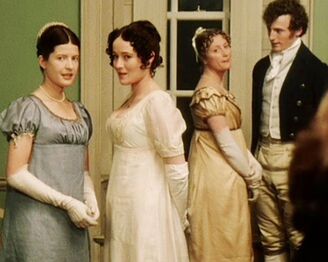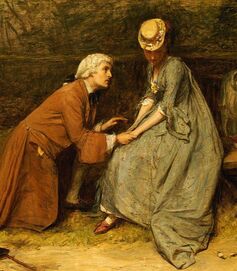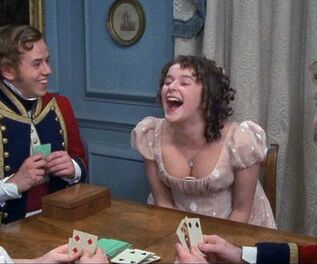
Charlotte Lucas thinks Jane is making a tactical error. A woman can hide her feelings from the world, but “if a woman conceals her affection with the same skill from the object of it, she may lose the opportunity of fixing him; and it will then be but poor consolation to believe the world equally in the dark.”
There was no more important decision for a young woman in Jane Austen’s time, than who to marry – presuming she received an offer. And yet, genteel young ladies were supposed to act confused or indignant if someone impertinently suspected them of making a conquest. Young ladies were supposed to be so totally free of guile that they would never angle to attract someone. Whatever bears affinity to cunning is despicable, said Darcy. Marianne Dashwood is highly indignant when Sir John Middleton teases her about Willoughby. "That is an expression, Sir John," said Marianne, warmly, "which I particularly dislike. I abhor every common-place phrase by which wit is intended; and 'setting one's cap at a man,' or 'making a conquest,' are the most odious of all. Their tendency is gross and illiberal..."
One indicator of the vulgarity of the Steele sisters in Sense & Sensibility is that Miss Steele wants everyone to believe she has an admirer, while denying she has one.
| "There now," said Miss Steele, affectedly simpering, "everybody laughs at me so about the Doctor, and I cannot think why. My cousins say they are sure I have made a conquest; but for my part I declare I never think about him from one hour's end to another…. "Aye, aye, that is very pretty talking—but it won't do,” [answers the cheerful but also vulgar Mrs. Jennings] — “the Doctor is the man, I see." "No, indeed!" replied her cousin, with affected earnestness, "and I beg you will contradict it, if you ever hear it talked of." Mrs. Jennings directly gave her the gratifying assurance that she certainly would NOT, and Miss Steele was made completely happy. |
 Keep those eyes downcast!
Keep those eyes downcast! Austen is referring to a 1751 essay by Samuel Richardson, an essay which was well-known in Austen’s day and frequently republished well into the 20th century: “That a young lady should be in love, and the love of the young gentleman undeclared is an heterodoxy which prudence, and even policy, must not allow.” Richardson extolls the good old days when young ladies kept their eyes downcast, left home only to go to church, and did not show any interest in a gentleman caller until their parents had sanctioned the match. Only then, could the young lady own “herself obliged to [her suitor] for his good opinion… and when he presses for the favour of her hand, he receives a declaration of an entire acquiescence with her duty, and a modest acknowledgment of esteem for him.”

In The Banker's Daughters of Bristol (1824), young Mary, the daughter of Major Coles, falls for dashing Captain Westbrook. Persuaded to reject him because of a wrongful slur against his character, she cuts him off and retires to her room to weep. But when her father explains that Westbrook is innocent, and tells her she needs to apologize, Mary demurs: “May he not, in that case, conceive, my father, that I feel a greater interest in what concerns him than is warranted by strict propriety?” With a great many blushes and sighs, Mary complies and her secret is revealed to the captain.
Sir Thomas Bertram gives Fanny Price an epic dressing-down when he learns, to his astonishment, that she means to refuse Henry Crawford. The only concession he makes is that she didn’t encourage him. She received his attentions “very properly.” “I have no accusation to make on that head.”
Austen appears to acknowledge this social expectation of reticence while laughing at its hypocrisy. As Mrs. Smith says to Anne Elliot, until the “right moment” comes, “you know, we women never mean to have anybody. It is a thing of course among us, that every man is refused, till he offers.”
Fanny Price scolds herself for even thinking of Edmund romantically, not because it was indelicate, but because of the class divide between them: "To call or to fancy it a loss, a disappointment, would be a presumption for which she had not words strong enough to satisfy her own humility. To think of him as Miss Crawford might be justified in thinking, would in her be insanity. Why did such an idea occur to her even enough to be reprobated and forbidden? It ought not to have touched on the confines of her imagination." Is this evidence of Fanny's perfection or is she trying to live up to impossibly high standards? Austen scholar Mary Waldron argues it's the latter, and we'll take that up next time.
We can assume that despite social conventions, and despite the "pictures of perfection" in the novels of the day, young ladies of Austen's time found ways to encourage the attentions of the gentlemen they liked. As John Dashwood advised his sister Elinor: "some of those little attentions and encouragements which ladies can so easily give will fix [Colonel Brandon], in spite of himself. And there can be no reason why you should not try for him."
Previous post: Meet Clarentine Next post: The faults of Fanny

 RSS Feed
RSS Feed